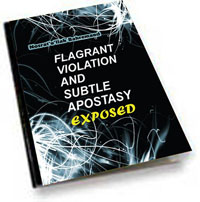Nakhjavani deceitfully has written:
“The obligation of the friends was now well-defined. They had to wait for the “guidance” of the Universal House of Justice, to elucidate what certainly appeared to be “obscure questions” (WTp.20). The expectations of the believers were fulfilled when, in response to questions asked, the Universal House of Justice wrote on 9 March 1965, on 27 May 1966, and on 7 December 1969, three letters (See MUHJ items # 23, 35 & 75 respectively) and explained for the friends the basic truths underlying the evolution of the Administrative Order of our Faith and left them free to conclude that the passing of the beloved Guardian, without having appointed a Successor as Guardian and Authorized Interpreter, was a clear possibility and an understandable event. ”
Comment:
It is glaringly obvious that the Institution of the Guardianship and the functions of the Guardian as “Head of the Faith” have been clearly and well defined by ‘Abdu’l-Baha in His Will and Testament and have been elaborated upon by Shoghi Effendi in his writings and certainly, the Guardianship is not included under the category of “obscure questions” which will require the enactment of future laws by that body and only a genuine Universal House of Justice presided over by the Guardian will be able to adequately respond to such questions in those instances where they are not covered in the Book. Following is the quotation from the Will and Testament from which Nakhjavani has borrowed the term and deceitfully transmuted its implication:
“It is incumbent upon these members (of the Universal House of Justice) to gather in a certain place and deliberate upon all problems which have caused difference, questions that are obscure, and matters that are not expressly recorded in the Book. Whatsoever they decide has the same effect as the Text itself. Inasmuch as the House of Justice hath power to enact laws that are not expressly recorded in the Book and bear upon daily transactions, so also it hath power to repeal the same.”
It should be noted by the reader that the institutions of the international and local Houses of Justice were ordained by Baha’u’llah but it was Abdu’l Baha who in His Will and Testament, provided for the Secondary (National) Houses of Justice and defined the method for the election of ihc Universal House of Justice and explained the composition and order of that august body, so wherever there is mention of the International or Universal House of Justice in the authoritative writings of the Faith it means the real and true Universal House of Justice as the Master specified and clearly explained.
“By this body, all the difficult problems are to be resolved and the Guardian of the Cause of God is its sacred head and the distinguished member for life of that body. Should he not attend in person its deliberations, he must appoint one to represent him. Should any of the members commit a sin, injurious to the commonweal, the Guardian of the Cause of God hath at his own discretion the right to expel him, whereupon the people must elect another one in his stead.” (Abdu’l-Baha, The Will and Testament, p. 14)
In the light of the Master’s described specifications for the true Universal House of Justice, it is obvious that this body created by the former Hands without the “sacred head and the distinguish member” is a fake and illegitimate body. What Nakhjavani portrays as “the evolution of the Administrative Order” is actually the flagrant attempt made by the former Hands and their man-made and bogus UHJ to corrupt the Administrative Order by eliminating its major pillar the Institution of the Guardianship.
Developments in the Administrative Order must be made only in obedience to every clause of the Will and Testament of Abdul-Baha, and in honoring the plans and arrangements that the first Guardian of the Faith projected that requires recognition of the second Guardian and realization of the fact that Shoghi Effendi faithfully fulfilled his obligation of appointing his successor during his own lifetime since the obligatory provision of the Will and Testament, quoted below, does not leave any other option for the Guardians:
“It is incumbent upon the Guardian of the Cause of God to appoint in his own lifetime him that shall become his successor that differences may not arise after his passing.”(The Will and Testament, p. 12)

